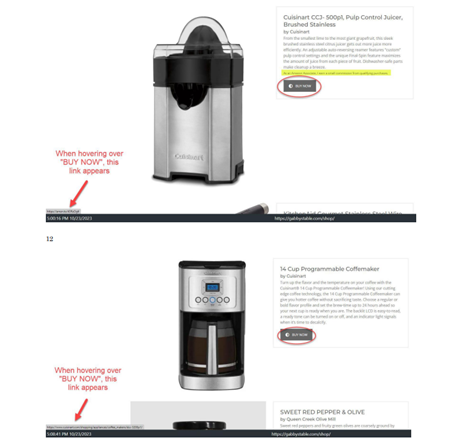The practice of using influencers, bloggers, and content creators to market and advertise a third party’s goods and services has exploded over the last decade. Such affiliate marketing now represents a sizable piece of most content creators’ income as well as consumer brands’ advertising budgets. In fact, according to Influencer Marketing Hub, more than 25% of brands currently use affiliate marketers, and it is estimated that $15.7 billion will be spent globally on affiliate marketing campaigns in 2024 alone. But, do these creators also offer retail services as defined by the US Trademark Office (USPTO) in the general course of their business? And, if not, how can influencers protect their own branding efforts as trademark use by the USPTO? These questions were recently raised by influencer Gail Weiss of Gabby’s Table before the US Trademark Trial and Appeal Board (TTAB) in In re Gail Weiss, Serial No. 88621608.
On July 31, 2024, the TTAB held in In re Gail Weiss that an influencer who merely provides links that allow their followers to purchase products via a third-party website did not constitute “retail services” for the purposes of obtaining a trademark registration and refused registration of Weiss’s trademark application.
Does affiliate linking qualify as a retail service?
Weiss filed a US trademark application, serial no. 88/621,608, on September 18, 2019, for the mark GABBY’S TABLE in connection with Computerized on-line retail store services in the field of food, cooking utensils, cookware, culinary arts cookbooks, magazines and videos, and lifestyle books, magazines, and videos in Class 35, on an intent to use basis. Later on, Weiss submitted a Statement of Use and provided specimens of her blog, which makes recommendations for third-party cooking products. The blog included a “buy now” button next to each advertised product, all of which appeared under a heading at the top of the blog entitled “shop.” By clicking on the “buy now” button, the user was directed to an Amazon product listing page where they could complete a purchase of the item. An example of this use as filed in the application is shown below:

Weiss argued that her blog provided virtual “shelf space” for the sale of goods to others, and, therefore, she qualified to register her trademark for “retail services” in Class 35. Weiss analogized her blog to a consignment store that assists in the completion of a purchase of third-party goods. Weiss argued that consumers identify the GABBY’S TABLE mark with on-line retail store services when they purchase goods from links posted on her blog.
The USPTO rejected Weiss’s specimens, finding that the blog itself did not demonstrate use of the GABBY’S TABLE mark with “on-line retail store services.” Rather, the examiner found that the third party, in this case, Amazon, offers the actual retail services, and that Weiss’s blog merely makes recommendations and directs consumers to Amazon without the ability for a consumer to directly complete the purchase on the blog itself. This position was upheld by the Trademark Trial and Appeal Board, and Weiss’s trademark application was refused.
Trademark protections available to influencers
So, how can influencers obtain the strongest trademark protection for their branding and marketing services? As In re Gail Weiss instructs simply providing a site that promotes the goods of others with links to complete the transaction on another site is not sufficient to constitute a trademark use for “online retail services” under Class 35. Without completing a direct sale of products to consumers, influencers will not be considered as offering the more direct online retail store service to consumers. Instead, we recommend that influencers continue to file trademark applications for their main blogging and entertainment and entertainment media production services in Classes 35 and 41, as well as including more direct identifications for advertising, marketing, affiliate marketing, and potentially even items such as event marketing, if applicable. As further protection for their offerings, influencers should consider including more general descriptions for the promotion of the goods and services of others or promotional sponsorship services in Class 35 as an additional way for creators to cover the broader scope of services they are likely offering.
Additionally, it remains important for influencers, like all trademark applicants, to provide proper examples of the use of their marks in each trademark application filing. The USPTO requires strict adherence to its rules of acceptable specimens of use of the mark before a trademark registration is granted. The trademark registration process requires consideration of each of these important factors to ensure filings are complete and accurate, otherwise the applicant risks delay or even loss of valuable trademark rights.
For more information on the content of this alert and how we can help you protect your valuable IP rights, please contact your Nixon Peabody attorney or the authors of this alert.
